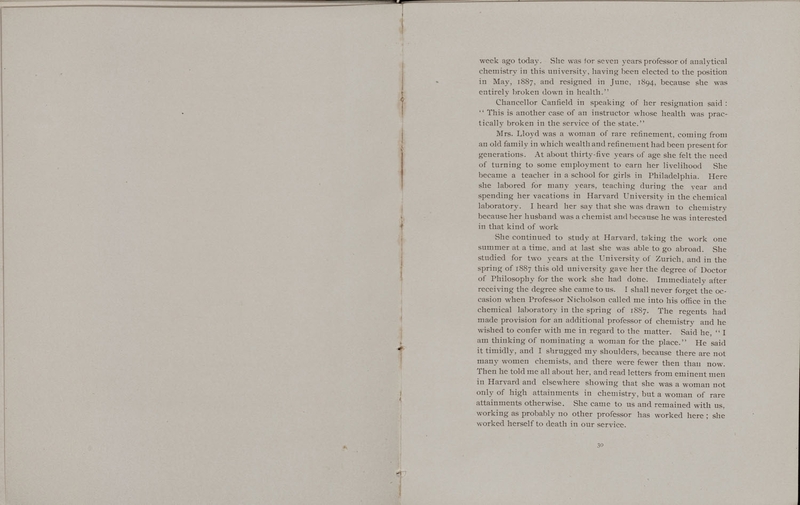https://mediacommons.unl.edu/MediaManager/srvr?mediafile=/Size4/UNL~120~120/2118/520100-00113.jpg
Media
Part of In Memoriam - Rachel Lloyd, Ph.D.
- extracted text
-
week ago today. She was for seven years professor of analy
chemistry in this university, having been elected to the position
in May, 1887, and resigned in June, 1894, because she was
entirely broken down in health.”
Chancellor Canfield in speaking of her resignation said
“This is another case of an instructor whose health was prac-
tically broken in the service of the state."
Mrs. Lloyd was a woman of rare refinement, coming from
an old family in which wealth and refinement had been present for
generations. At about thirty-five years of age she felt the need
of turning to some employment to earn her livelihood She
became a teacher in a school for girls in Philadelphia. Here
she labored for many years, teaching during the year and
spending her vacations in Harvard University in the chemical
laboratory. I heard her say that she was drawn to chemistry
because her husband was a chemist and because he was interested
in that kind of work
She continued to study at Harvard, taking the work one
summer at a time, and at last she was able to go abroad. She
studied for two years at the University of Zurich, and in the
spring of 1887 this old university gave her the degree of Doctor
of Philosophy for the work she had done. Immediately after
receiving the degree she came tous. I shall never forget the oc-
casion when Professor Nicholson called me into his office in the
chemical laboratory in the spring of 1887. ‘The regents had
made provision for an additional professor of chemistry and he
wished to confer with me in regard to the matter. Said he, “I
am thinking of nominating a woman for the place.”? He said
it timidly, and I shrugged my shoulders, because there are not
many women chemists, and there were fewer then than now.
‘Then he told me all about her, and read letters from eminent men
in Harvard and elsewhere showing that she was a woman not
only of high attainments in chemistry, but a woman of rare
attainments otherwise. She came to us and remained with us,
working as probably no other professor has worked here ; she
worked herself to death in our service.
30

